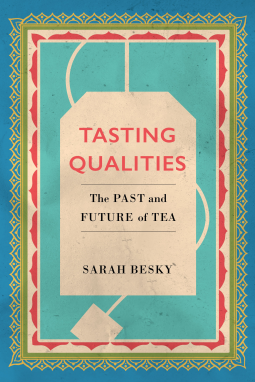Please wait... This may take a moment.
Tasting Qualities
The Past and Future of Tea
This title was previously available on NetGalley and is now archived.
Pub Date
May 12 2020
| Archive Date
Jul 16 2020
Description
What is the role of quality in contemporary capitalism? How is a product as ordinary as a bag of tea judged for its quality? In her innovative study, Sarah Besky addresses these questions by going inside an Indian auction house where experts taste and appraise mass-market black tea, one of the world’s most recognized commodities. Pairing rich historical data with ethnographic research among agronomists, professional tea tasters and traders, and tea plantation workers, Besky shows how the meaning of quality has been subjected to nearly constant experimentation and debate throughout the history of the tea industry. Working across fields of political economy, science and technology studies, and sensory ethnography, Tasting Qualities argues for an approach to quality that sees it not as a final destination for economic, imperial, or post-imperial projects but as an opening for those projects.
What is the role of quality in contemporary capitalism? How is a product as ordinary as a bag of tea judged for its quality? In her innovative study, Sarah Besky addresses these questions by going...
Description
What is the role of quality in contemporary capitalism? How is a product as ordinary as a bag of tea judged for its quality? In her innovative study, Sarah Besky addresses these questions by going inside an Indian auction house where experts taste and appraise mass-market black tea, one of the world’s most recognized commodities. Pairing rich historical data with ethnographic research among agronomists, professional tea tasters and traders, and tea plantation workers, Besky shows how the meaning of quality has been subjected to nearly constant experimentation and debate throughout the history of the tea industry. Working across fields of political economy, science and technology studies, and sensory ethnography, Tasting Qualities argues for an approach to quality that sees it not as a final destination for economic, imperial, or post-imperial projects but as an opening for those projects.
Advance Praise
"Refreshingly focused on spaces 'in between' plantation production and restorative consumption, Besky incisively details the expert work of blending, tasting, evaluating, and auctioning that regularizes every bag of 'regular' black tea to deliver a 'nice cuppa'—producing qualities, she argues, that also reproduce India’s plantation form of monocrop agriculture."—Heather Paxson, author of The Life of Cheese: Crafting Food and Value in America
"A ‘nice cup of tea’ may be a small thing; the making of that ‘niceness’ is as big a subject as any taken on by anthropologists or historians. Tasting Qualities is an impressive account of the complex networks of expert practices and sites––plantations, auctions, blending rooms, scientific laboratories––in which qualitative judgments are made and then transformed into a priced product on the market."—Steven Shapin, Franklin L. Ford Research Professor of the History of Science, Harvard University
"Refreshingly focused on spaces 'in between' plantation production and restorative consumption, Besky incisively details the expert work of blending, tasting, evaluating, and auctioning that...
Advance Praise
"Refreshingly focused on spaces 'in between' plantation production and restorative consumption, Besky incisively details the expert work of blending, tasting, evaluating, and auctioning that regularizes every bag of 'regular' black tea to deliver a 'nice cuppa'—producing qualities, she argues, that also reproduce India’s plantation form of monocrop agriculture."—Heather Paxson, author of The Life of Cheese: Crafting Food and Value in America
"A ‘nice cup of tea’ may be a small thing; the making of that ‘niceness’ is as big a subject as any taken on by anthropologists or historians. Tasting Qualities is an impressive account of the complex networks of expert practices and sites––plantations, auctions, blending rooms, scientific laboratories––in which qualitative judgments are made and then transformed into a priced product on the market."—Steven Shapin, Franklin L. Ford Research Professor of the History of Science, Harvard University
Available Editions
| EDITION |
Other Format |
| ISBN |
9780520303256 |
| PRICE |
$29.95 (USD)
|
| PAGES |
256
|
Additional Information
Available Editions
| EDITION |
Other Format |
| ISBN |
9780520303256 |
| PRICE |
$29.95 (USD)
|
| PAGES |
256
|
Average rating from 2 members
Featured Reviews
 Librarian 599090
Librarian 599090
4 stars
4 stars
4 stars
4 stars
4 stars
Part history, part memoir this book will appeal to tea aficionados as much as academic audiences. The scene setting was terrific. Some of the content may feel a bit dull if tea is not your THING but if it is, you will enjoy this look at the tea industry, its history, and what makes the price of tea and its availability move on the market.
I received an advanced reader copy of the book from the NetGalley so I could write an honest review.
4 stars
4 stars
4 stars
4 stars
4 stars

 Librarian 599090
Librarian 599090



